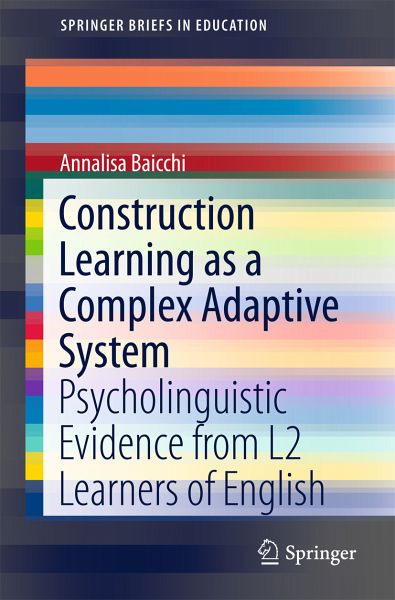
Construction Learning as a Complex Adaptive System (eBook, PDF)
Psycholinguistic Evidence from L2 Learners of English
Versandkostenfrei!
Sofort per Download lieferbar
40,95 €
inkl. MwSt.
Weitere Ausgaben:

PAYBACK Punkte
20 °P sammeln!
This book presents the current state of the art on Construction Grammar models and usage-based language learning research. It reports on three psycholinguistic experiments conducted with the participation of university-level Italian learners of English, whose second language proficiency corresponds to levels B1 and B2 of the 'Common European Framework of Reference for Languages' (CEFR). This empirical research on the role of constructions in the facilitation of language learning contributes to assessing how bilinguals deal with L2 constructions in the light of sentence-sorting, sentence-elicit...
This book presents the current state of the art on Construction Grammar models and usage-based language learning research. It reports on three psycholinguistic experiments conducted with the participation of university-level Italian learners of English, whose second language proficiency corresponds to levels B1 and B2 of the 'Common European Framework of Reference for Languages' (CEFR). This empirical research on the role of constructions in the facilitation of language learning contributes to assessing how bilinguals deal with L2 constructions in the light of sentence-sorting, sentence-elicitation, and sentence-completion tasks. Divided into two parts, the book first introduces the main theoretical prerequisites and then reports on the experimental studies. It provides a comprehensive review of the current research in a range of disciplines, including complexity theories, cognitive semantics, construction grammars, usage-based linguistics, and language learning.
Dieser Download kann aus rechtlichen Gründen nur mit Rechnungsadresse in A, B, BG, CY, CZ, D, DK, EW, E, FIN, F, GR, HR, H, IRL, I, LT, L, LR, M, NL, PL, P, R, S, SLO, SK ausgeliefert werden.













